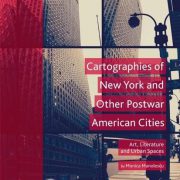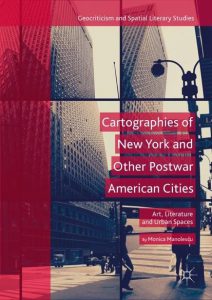À l’occasion de la sortie du tome III des œuvres romanesques de Vladimir Nabokov dans la Pléiade, incluant Pnine – Feu pâle – Ada ou L’Ardeur – La transparence des choses – Regarde, regarde les arlequins! – L’original de Laura, la Société française Vladimir Nabokov a interviewé le directeur du volume, Maurice Couturier.
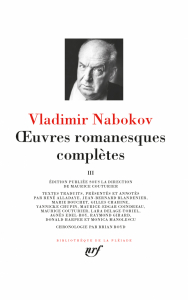
Entretien avec Maurice Couturier
Le volume commence par une retraduction de Pnine. Qu’est-ce qui a motivé le choix de retraduire ce texte en particulier ?
- Je n’étais pas le seul à regretter la mauvaise qualité de la première traduction de Pnine ; j’ai reçu des offres à ce propos. Chrétien use d’une langue souvent lourde, voire incorrecte, et demeure trop loin du texte original. Les subtilités narratives de Nabokov ne sont pas toujours prises en compte. Mes recherches théoriques dans le domaine linguistique et narratologique me prédisposaient à assumer cette retraduction. Pour la première fois de ma carrière de traducteur, j’ai décidé de faire cette traduction sans avoir de contrat, et donc sans percevoir de droits autres que ceux du maigre pourcentage dans la Pléiade. J’estimais que cela en valait la peine. J’ai aussi légèrement revu la traduction des autres romans, Ada excepté : Ada a été abondamment corrigé, trop peut-être parfois, par Nabokov lui-même. D’où la décision de ne pas retoucher, sauf à la marge, le texte. L’appareil critique de ce roman, réalisé par une équipe de chercheuses dynamiques et savantes, fera date.
Avez-vous remarqué des choses en particulier en retraduisant Pnine ? Se prête-t-il facilement à la langue française, comme vous en aviez fait la remarque pour votre retraduction de Lolita ?
- L’anglais de Nabokov n’a pas, dans ce roman, la fluidité qu’il avait dans Lolita. Il se prête moins facilement à la langue française. J’ai souvent eu le sentiment qu’il était parasité par le russe, arrière-plan culturel et linguistique du récit. Il est infiniment moins précis et contient une foule de mots au spectre sémantique assez flou. Nabokov ne s’est pas autant relu et corrigé que dans Lolita.
Lorsque vous avez annoté Feu pâle, avez-vous dû conduire de nouvelles recherches ? Qu’avez-vous préféré annoter, le poème, le commentaire, autre chose ?
- Feu pâle est le roman sur lequel j’ai le plus travaillé pendant ma carrière, le premier sur lequel j’ai publié un article. Il a joué un rôle capital dans l’élaboration de ma théorie de « la figure de l’auteur ». Il a donc été au cœur de ma recherche théorique. Pour ces annotations, je me suis appuyé sur ce qui existait, sur Dieter Zimmer en particulier, mais ai aussi mené des recherches personnelles importantes. L’annotation de chacune des parties m’a procuré un vif plaisir intellectuel.
En quoi consiste le rôle de directeur de la Pléiade Nabokov ? Comment avez-vous travaillé avec les différents annotateurs ? Pour choisir quelles annotations resteront et lesquelles partiront (la place est limitée après tout), le choix était-il fait en concertation ? par vous, par l’annotateur, par l’éditeur peut-être ? Y a-t-il des annotations que vous regrettez d’avoir dû retirer plus que d’autres ?
- Le rôle du directeur d’une telle édition est multiple : élaboration, avec Gallimard (Hugues Pradier), des consignes éditoriales en fonction du volume prévu pour l’appareil critique, conséquent en la circonstance ; choix des annotateurs, choix des collaborateurs qui corrigeront les traductions, choix des romans qu’il souhaite annoter lui-même, relecture des différents appareils critiques, et correction des épreuves. Négociations avec les collaborateurs : elles furent très aisées pour les volumes 2 et 3, plus difficiles pour le volume 1. Réponse aux sollicitations des journalistes et des médias. Je n’ai pas souvenir que nous ayons dû sacrifier des choses importantes dans les annotations.
La pandémie a-t-elle eu un impact sur la publication, notamment son calendrier ?
- Oui, bien sûr. La sortie du volume était prévue pour avril 2020. Elle survient le 4 février 2021. Et la manifestation que j’avais prévue à la Fondation Deutsch de la Meurthe a dû être annulée. L’offre de son directeur, un de mes amis, demeure.
A-t-il été question, à un moment donné, d’inclure dans la Pléiade les poèmes, les nouvelles ou les pièces de théâtre de l’auteur ?
- Non, il n’en a jamais été question. Il est toujours possible d’envisager un quatrième volume pour cela. À la nouvelle génération de Nabokoviens de l’entreprendre.
Maintenant que ce travail monumental est terminé, avez-vous des projets particuliers relatifs à Nabokov ou souhaitez-vous faire une pause ? On connaît vos nombreuses activités, que ce soit l’écriture ou la traduction d’auteurs comme David Lodge.
- Je n’ai pas de projets particulier relatifs à Nabokov dans l’immédiat, sinon de transférer mon fonds Nabokov (6 mètres linéaires) à la Bibliothèque Universitaire de Strasbourg qui a accepté de l’héberger. Pas question pour autant de faire une pause : l’écriture est pour moi une nécessité vitale. J’écris actuellement quelque chose en anglais ; déjà six cents pages. Et je vais sans doute traduire le troisième et dernier volume de l’autobiographie de David Lodge.
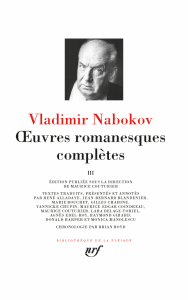
Tome III – Pnine – Feu pâle – Ada ou L’Ardeur – La transparence des choses – Regarde, regarde les arlequins! – L’original de Laura.
Édition publiée sous la direction de Maurice Couturier. Textes traduits de l’anglais, présentés et annotés par René Alladaye, Jean-Bernard Blandenier, Marie Bouchet, Brian Boyd, Gilles Chahine, Yannicke Chupin, Maurice-Edgar Coindreau, Maurice Couturier, Lara Delage-Toriel, Agnès Edel-Roy, Raymond Girard, Donald Harper et Monica Manolescu.
Parution le 4 Février 2021
Bibliothèque de la Pléiade, n° 648
1648 pages, rel. Peau, 105 x 170 mm

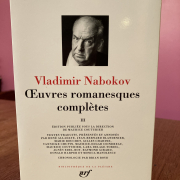
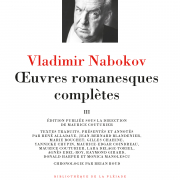
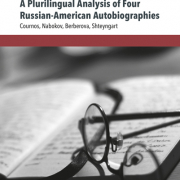
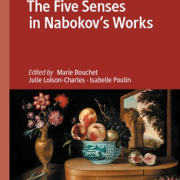
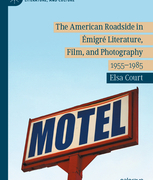

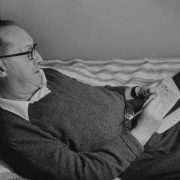
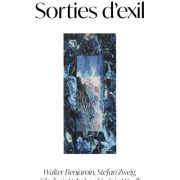
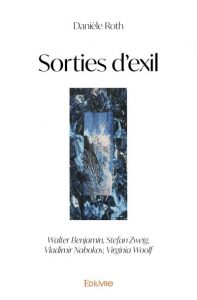
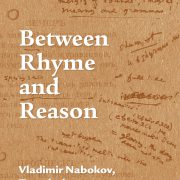
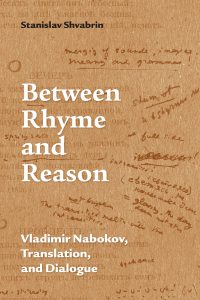 The author of such global bestsellers as Lolita and Pale Fire, Vladimir Nabokov (1899–1977) is also one of the most controversial literary translators and translation theorists of modern time. In Between Rhyme and Reason, Stanislav Shvabrin discloses the complexity, nuance, and contradictions behind Nabokov’s theory and practice of literalism to reveal how and why translation came to matter to Nabokov so much.
The author of such global bestsellers as Lolita and Pale Fire, Vladimir Nabokov (1899–1977) is also one of the most controversial literary translators and translation theorists of modern time. In Between Rhyme and Reason, Stanislav Shvabrin discloses the complexity, nuance, and contradictions behind Nabokov’s theory and practice of literalism to reveal how and why translation came to matter to Nabokov so much.